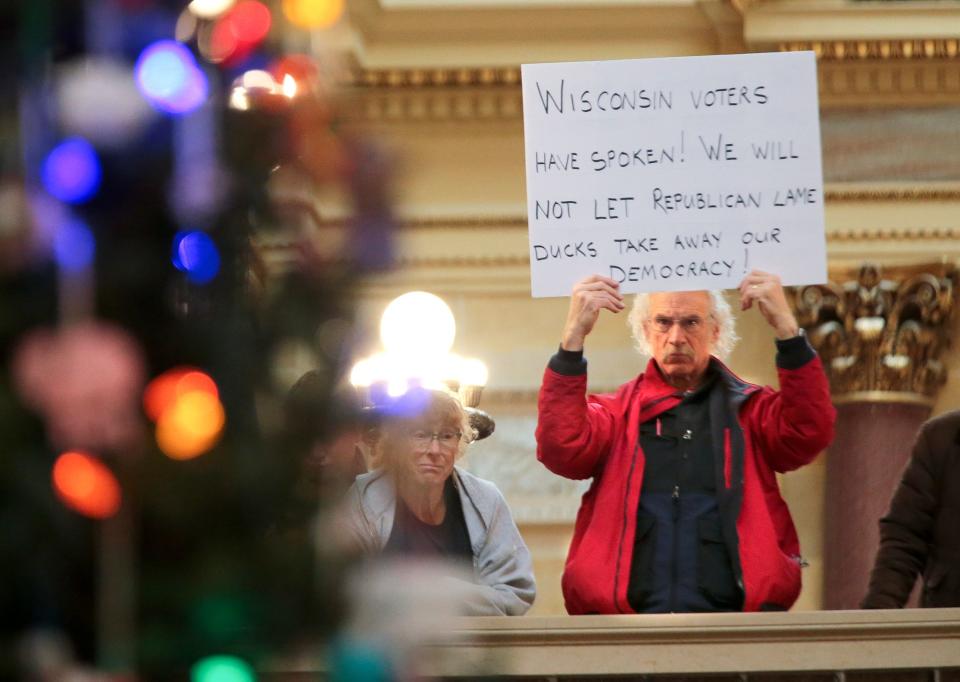Wisconsin GOP makes lame-duck moves to strip incoming Dems' power: What you need to know
38671011
Wisconsin Republicans passed legislation Wednesday that will diminish the powers of the governor and attorney general, and limit early voting, before Democrat Tony Evers takes office on Jan. 7.
The measure passed the state Senate early Wednesday by one vote before being approved by the General Assembly. Outgoing Republican Gov. Scott Walker said he intends to sign the legislation.
The Republicans held overnight negotiations among themselves behind closed doors in lame-duck session to iron out the details of the legislation. They also tried to pass a bill to protect coverage for people with pre-existing conditions, but that measure failed Wednesday.
Here is what you need to know about the political power struggle playing out in Wisconsin:

How will the legislation limit the governor's power?
The bill would give the state legislature control of the board of the Wisconsin Economic Development Corp. – an agency created by Walker in 2011 to replace the Wisconsin Department of Commerce – through September. Under the proposed law, the board will be able to choose its CEO, a power held by the governor under current law. The WEDC has the power to grant loans and tax breaks to individual businesses.
The legislation would also include a provision expanding lawmakers' ability to block rules out of the governor's office. Earlier versions of the bill gave lawmakers more power to limit those rules.
It would also require Evers to get permission from lawmakers to ban guns in the state Capitol and to get permission to ask the federal government for any changes to programs run jointly with the state.
How will it limit the attorney general's powers?
The legislation will put lawmakers in charge of litigation, allowing them to keep alive a lawsuit to overturn the Affordable Care Act. It would also give them, rather than incoming Democratic Attorney General Josh Kaul, control over how court settlements are spent.
An earlier and controversial provision allowing the legislature to hire private, taxpayer-funded lawyers in place of Kaul was dropped from the most recent version of the legislation. But other provisions stayed that would allow lawmakers to more easily hire private attorneys when they are sued for violating the open records law or other statutes.
How will it affect early voting?
The proposed legislation would limit early voting to two weeks. A federal judge struck down a similar law in 2016 and under his ruling, local officials set their own schedules for early voting. In Madison, that meant six weeks of early voting in the midterm election.
Are any Wisconsin Republicans opposing the effort?
Republican state Sen. Rob Cowles was the lone Republican to vote against the legislation in Wisconsin's Senate. It passed in that chamber 17-16.
Why is the Republicans' justification?
Republican lawmakers argue they are re-establishing balance between the branches of government.
"Whether everyone here likes it or not, I respect the fact that Tony Evers is the governor and he’s going to be starting on January 7," Assembly Speaker Robin Vos said. "But he’s not the governor today and that’s why we’re going to make sure the powers of each branch are as equal as they can be."
Vos said he was confident the legislation could survive the inevitable legal challenges that will follow its passage.
"Everything we’ve done is within the bounds of the constitution and I think it will be found that way," he said.
How are Democrats responding?
Democrats have assailed the plan as a repudiation of the Nov. 6 election that felled Walker and swept Democrats into statewide offices.
Evers said the new lame-duck moves could end up making it more difficult for the two sides to reach common ground.
"Co-equal branches is not subjective depending who is in office," said Assembly Democratic Leader Gordon Hintz of Oshkosh. "It’s about the fundamental structure of how government is supposed to work and you guys are fundamentally changing that."
"Unfortunately, I think this extraordinary session says that the Republicans don't believe that people of this state have the right or the intelligence to elect their leaders," said Sen. LaTonya Johnson, a Milwaukee Democrat.
Contributing: Patrick Marley and Molly Beck, Milwaukee Journal Sentinel
This article originally appeared on USA TODAY: Wisconsin GOP makes lame-duck moves to strip incoming Dems' power: What you need to know

